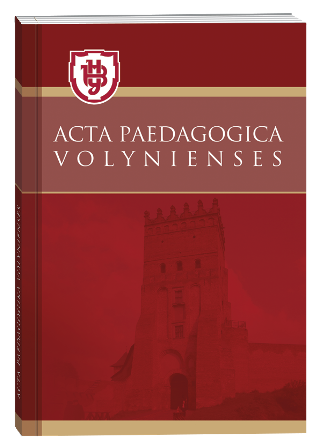PECULIARITIES OF THE BEHAVIOR SCHOOL AGE CHILDREN WITH INTELLECTUAL DISABILITY
DOI:
https://doi.org/10.32782/apv/2022.6.13Keywords:
older schoolchildren, behavior, children with intellectual disabilities, socialization, communication skillsAbstract
The article presents the results of a theoretical-experimental study of the characteristics of the behavior of senior schoolchildren with intellectual disabilities. The purpose of the article is to identify the characteristics of the behavior of children of high school age with intellectual disabilities. The research was carried out during the preparatory, experimental and generalization stages. At the preparatory stage, the state of development of the problem in science was studied, criteria and indicators of behavior were determined, the construct of diagnostic methods was developed; at the second stage, a ascertaining experiment was conducted using questionnaires, at the third stage, the analysis, systematization, and processing of the accumulated empirical material was carried out. It has been established that a decrease in impulsivity and a tendency to the occurrence of behavioral disorders against the background of the development of cognitive and affective processes is common to senior schoolchildren with normotypical development and intellectual disorders. Among both groups of children, respondents who demonstrate a tendency to conformist, antisocial and antisocial behavior were found. As a result of disruption of neurodymic processes, difficulties in establishing cause-and-effect relationships, older schoolchildren with intellectual disabilities are more prone to behavioral disorders. The level of communicative abilities of schoolchildren with intellectual disabilities is significantly lower. Such children do not seek communication, they feel constrained in a new company; they prefer to spend time alone, they limit their acquaintances; have difficulties in establishing contacts with people; are poorly oriented in an unfamiliar situation; are painfully experiencing insults. Senior schoolchildren with intellectual disabilities are characterized by difficulties in communicative interaction and distinct violations of organizational abilities, which are manifested in the inability to plan and control activities, make decisions and assume responsibility for their implementation.
References
Бондарчук О. І. Психологія девіантної поведінки. Курс лекцій. Київ : МАУП, 2006. 88 с.
Коваленко В. Є. Особливості діяльнісно-поведінкового компонента соціалізованості молодших школярів з інтелектуальними порушеннями. Особлива дитина: навчання і виховання. 2022. № 1(105). С. 30–42.
Миронова С. П. Теоретико-методичні основи підготовки майбутніх учителів до корекційної роботи в освітніх закладах для дітей з вадами інтелекту : автореф. дис. ... докт. пед. наук: 13.00.03. Київ, 2007. 36 с.
Синьов В. М., Бистрова Ю. О., Коваленко В. Є. Висвітлення проблеми емоційно-поведінкових порушень в осіб з інтелектуальною недостатністю в українській психолого-педагогічній науці. Актуальні питання корекційної освіти (педагогічні науки). 2019. №13. С. 242–256.
Синьов В. М. Психолого-педагогічні проблеми дефектології та пенітенціарії. Київ : «МП Леся», 2010. 779 с.
Христук О. Л. Психологія девіантної поведінки. Львів : ЛьвДУВС, 2014. 192 с.
Kovalenko V., Syniov V., Peretiaha L., Halii A. The current state of involvement of children with special educational needs in out-of-school education in Ukraine. Amazonia Investiga. 2021. 10(42). P. 31–42.
KovalenkoV., Bystrova Yu., Kazachiner O. Social and pedagogical support of children with disabilities in conditions of general secondary educational establishments. Journal for Educators, Teachers and Trainers. 2022. Vol. 12(3). P. 101–114.
Kovalenko V., Bystrova Yu., Sinopalnikova N. Features of understanding and emotional attitude toward the moral and social norms of pupils with intellectual disabilities. Laplage em Revista (International). 2021. Vol. 7. P. 575–588.







